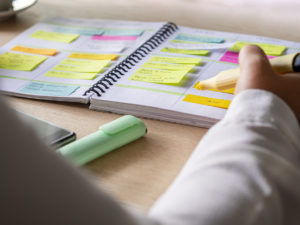
Often, lawyers can improve their success by improving their focus and productivity. The profession demands long hours, sustained attention, constant decision-making, and the ability to rapidly switch between tasks without missing critical details. The stakes are high, and so is the pressure. Over time, even the most accomplished attorneys can find their focus slipping—especially in today’s distraction-saturated world.
As a psychiatrist and executive coach who specializes in performance and productivity, I work with high-performing professionals—including many lawyers—to help them sharpen their focus and operate at peak performance. The following seven strategies are based on cognitive neuroscience, behavioral psychology, and real-world experience in helping attorneys get more done with less stress.
1. Start Your Day With One Big Win and Boost Your Productivity
Before you check email or respond to texts, identify the most important task of the day—the one that moves the needle forward. This is often a brief, high-impact action: drafting a key section of a brief, preparing for a negotiation, or organizing your notes for court. Even 60–90 minutes of uninterrupted work on this priority can build momentum and change the tone of your day.
Think of this as your “anchor task.” Complete it early, and you’ll feel more focused and in control the rest of the day.
2. Use the 52/17 Focus Rhythm
The human brain is not designed to work for hours at a stretch without rest. One of the most effective productivity patterns I teach is the 52/17 rhythm: 52 minutes of focused work followed by 17 minutes of active rest. During the 52 minutes, eliminate all distractions—no email, no multitasking, no Slack. During the 17-minute break, get up, stretch, take a walk, or engage in light conversation. This rhythm prevents burnout and enhances sustained attention.
3. Schedule “Cognitive Sprints” Instead of Open-Ended Work
Lawyers often leave open-ended time blocks to “work on that memo,” which invites procrastination. Instead, reframe your work into sprints. For example, “For the next 25 minutes, I’ll outline the argument section.” The time constraint creates urgency, and the narrow focus reduces overwhelm.
Cognitive sprints improve both quality and efficiency. They’re especially helpful when you’re facing a large, ambiguous task that feels hard to start.
4. Practice Strategic Email Hygiene
Email is one of the most common productivity traps for attorneys. Rather than checking constantly throughout the day, batch your email into 2–3 focused windows—ideally after completing your anchor task. Turn off notifications and resist the urge to reply instantly unless it’s urgent.
Use folders and filters to prioritize client communications. A good rule: if a reply takes less than two minutes, handle it during one of your email windows. If not, schedule a specific time to respond thoughtfully.
5. Use Mental Anchors to Transition Between Tasks
Context switching is a major drain on cognitive energy. Instead of jumping from one task to another, take 60 seconds to mentally “close the loop” on the previous task—write down where you left off, what’s next, and any loose ends. Then take a brief moment to breathe, stretch, or walk before diving into the next priority. This practice resets your attention and helps you stay fully present.
6. Clarify What “Done” Looks Like
Vague goals like “work on deposition questions” tend to linger on to-do lists. Instead, define what completion means: “Write five questions for the expert witness” or “Outline the main argument threads.” When your brain knows exactly what the finish line is, it’s easier to focus and easier to stop when you’ve achieved it. Clarity reduces cognitive load and increases productivity.
7. Protect Sleep Like You Protect a Court Deadline
High-functioning lawyers often sacrifice sleep in the name of productivity. But chronic sleep deprivation impairs decision-making, focus, memory, and mood—exactly the functions legal work depends on. Treat sleep like an investment in your performance. Set a hard stop to your workday, dim screens at night, and establish a calming pre-bed routine. Even an extra 30–45 minutes of sleep can improve your mental sharpness the next day.
Final Thought
Improving focus and productivity as a lawyer doesn’t require working harder—it requires working smarter. By implementing these science-backed strategies, you can reduce mental fatigue, get more meaningful work done in less time, and perform at the level your clients, colleagues, and your own standards demand.
If you’re interested in learning more about how to optimize your mental performance, productivity, and leadership as a high-achieving attorney, visit www.scottshapiromd.com. I work with professionals like you to remove mental roadblocks and help you function at your best—consistently.




